- Home
- Scott Westerfeld
Peeps p-1 Page 17
Peeps p-1 Read online
Page 17
She looked up again, narrowing her eyes. “You’ve seen it happen, haven’t you?”
I paused for a moment.
“Dude, no lying to me. Remember?”
“All right, Lace. Yes, I’ve seen someone change.”
“A friend?”
I nodded.
A satisfied expression crept onto Lace’s face. “That’s how you got into this Night Watch business, isn’t it?”
“Yeah. That’s right.” I looked at the other tables to see if anyone was listening, hoping that Lace didn’t go much further with this line of questioning. I could hardly tell her that my first peep experience had been with a lover; she knew the parasite was sexually transmitted. “A friend of mine got the disease. I saw her change.”
Oops. Should I have said her?
“So, it’s like you said when you were pretending to be a health guy—you’re following a chain of infection. You’re tracking down all the people who caught the disease from that friend of yours. Morgan was someone who slept with someone who slept with your friend who turned, right?”
Now I was playing with my own silverware. “More or less.”
“Makes sense,” she said softly. “Today I was thinking that some people must find out about the disease on their own, just by accident, like I did. So the Night Watch has to recruit them to keep the whole thing a secret. And that must be where you guys get new staff. It’s not like you can advertise in Help Wanted, after all.”
“No shit, Sherlock.” I tried to chuckle. “You’re not looking for a job, are you?”
She was silent for a moment, not answering my little jest, which made me extremely nervous. The waiter arrived with two steaming plates, uncovering them with a flourish. He hovered over us, grinding pepper onto Lace’s pasta and pouring me more water. The smell of sausage rose up from my plate, switching my still-hungry body into a higher gear. I dug in the moment the waiter left, the taste of cooked flesh and spices making me shudder with bliss.
Hopefully, the uncomfortable questions were done with. I watched as Lace wound a big gob of spaghetti onto her fork, a process that seemed to absorb all her concentration, and as the silence stretched out and the calories entered my bloodstream, I told myself to chill.
It wasn’t so surprising that Lace had spent a whole day thinking about my revelations of the night before. It was crazy to get all jumpy about a few obvious questions. As the sausage suffused my system, placating the parasite, I began to relax.
Then Lace spoke up again. “I mean, I wouldn’t want your job. Mucking around in tunnels and stuff. No way.”
I coughed into my fist. “Um, Lace…”
“But you’ve got those guys who gave you the building plans, right? Records, you called them? And you have to research the history of the sewers and subways and stuff. I was thinking about that today. That’s why I went into journalism, you know.”
“For the sewer research?”
“No, dude. To find out what’s really going on, to get behind the scenes. I mean, there’s this whole other world that no one knows about. How cool is that?”
I put my fork and knife down firmly. “Listen, Lace. I don’t know if you’re serious, but it’s out of the question. The people who work in Records come from old families; they grew up with this secret history. They can speak Middle English and Dutch and identify clerks who lived centuries ago by their handwriting. They’ve all known one another for generations. You can’t just show up and ask for a job.”
“That’s all very impressive,” she said, then smirked. “But they suck at finding people.”
“Pardon me?”
Lace’s grin grew wider as she wound another spindle of spaghetti onto her fork, then put it into her mouth, chewing slowly. Finally, she swallowed.
“I said they suck at finding people.”
“What do you mean?”
“Let me show you something, dude.” She pulled out a few folded photocopies from her inside jacket pocket and handed them to me. I pushed my empty plate aside and unfolded them on the white tablecloth.
They were the floor plans to a house, a big one. The labels were written by hand in a flowing script, and the photocopies had that gray tinge that meant the originals had been on old, yellowing paper.
“What is this?”
“That’s Morgan Ryder’s house.”
I blinked. “Her what?”
“Her family’s, actually, but she’s staying there now.”
“No way.”
“Way, dude.”
I shook my head. “Records would have found her already.”
Lace shrugged, her fork twirling, the last strands of spaghetti on her plate trailing like a satellite picture of a hurricane. “It wasn’t even that hard. All I had to do was go through the phonebook, calling all the Ryders, asking for Morgan. The first dozen said there was nobody there by that name. Then one of them got all paranoid and asked me who the hell I was.” She laughed. “I got nervous and hung up.”
“That doesn’t prove anything.”
Lace pointed at the papers in my hand. “That’s the place, according to the address in the phone book. It’s even in the historical register—belonged to the Ryders since it was built.”
I stared at the plans, shaking my head. There was no way this could have gotten past Records; the Mayor’s office would have checked with her family directly. “But she’s not there. She’s missing, like I said.”
“You said pale? Dark hair and kind of gothy?”
I opened my mouth, but it took a while for sound to come out. “You went there?”
Lace nodded, beginning to wind another spindle of pasta. “Of course, I didn’t knock on the door. I’m more into investigation than confrontation. But the house has these big bay windows. And the weirdest thing is, Morgan doesn’t look crazy at all. Just bored, sitting at the window and reading. Do peeps read, dude?”
I remembered the photos Chip had given me and pulled them from my jacket. Lace took one glance at Morgan’s and nodded. “That’s the girl.”
“It can’t be.” My head was swimming. The Night Watch couldn’t have screwed up like this. If Morgan was sitting around in plain view, someone would have spotted her. “Maybe she has a sister,” I muttered, but darker thoughts were already coursing through my mind. The Ryders were an old family. Maybe they were pulling strings, using their connections to keep her hidden. Or maybe Records was afraid to go after the Mayor’s old friends.
Or maybe I’d filled out the wrong damn form.
Whatever had happened, I felt like an idiot. Everyone always joked about how we hunters were too lazy to do our own research, waiting for Records or the Health and Mental moles to tell us where the peeps were. I’d never even thought to open a phone book and look for Morgan Ryder myself.
“Don’t look so bummed, dude,” Lace said. “Morgan might not be infected, after all. I mean, she looked all normal. I thought you said peeps were maniacs.”
Still dazed, I shook my head and answered, “Well, she could be a carrier.”
Too late, I bit my tongue.
“A carrier?” Lace asked.
“Um, yes. Carries the disease, but without the symptoms.”
She paused, spaghetti dangling from her fork. “You mean, like Typhoid Mary? Spreading typhus all over the place but never coming down with it?” Lace laughed at my expression. “Don’t look so surprised, dude. I’ve been reading about diseases all day.”
“Lace, you have to stop doing this!”
“What? Acting like I have a brain? Puh-lease.” She took a bite. “So there are people who just carry the parasite? Infected but not crazy?”
“Yes,” I said, swallowing. “But it’s very rare.”
“Huh. Well, there’s one way to find out. We should go over there.”
“We?”
“Yeah, we’re practically there already.” She hooked her thumb toward the door, another satisfied grin spreading across her face. “It’s right at the end of this street.”
/>
Ryder House filled an entire corner lot, a three-story mansion with all the trimmings: bay windows, tall corner turrets, widow’s watches peering down at us with arched eyebrows. In the moonlight, the house had an intimidating look—a little too well maintained to play the part of the haunted manor, but a good headquarters for the bad guys.
I reached into my jacket pocket to heft the cold metal of my knockout injector. I’d reloaded it after taking down Patricia Moore and had decided not to hand it over to the transport squad when I’d turned in my duffel bag. However much Chip complained, sloppy equipment-keeping sometimes had its advantages.
“And you’re sure it was her?”
“Totally, dude.” Lace pointed at a bay of three windows bulging out from the second floor. “Right up there, sitting and reading. So what do we do? Knock on the door?”
“We don’t do anything!” I said harshly. “You go back to my apartment and wait.”
“I can wait here.”
“No way. She might see you.”
“Dude, it’s too dark.”
“Peeps can see in the dark!” I hissed.
Lace’s eyes narrowed. “But she’s like Typhoid Mary, right? No symptoms.”
I groaned. “Okay, with typhus, that’s true. But peep carriers do have some symptoms. Like night vision and good hearing.”
“And they’re really strong too, aren’t they?”
“Listen, just get out of here. If she—” My voice dropped off. From the darkness beneath the Ryders’ bushes, a pair of eyes had just blinked at us, glinting in the moonlight. “Crap.”
“What is it, Cal?”
My eyes scanned the shadowed street. In the bushes, under cars, from a high window in the mansion, at least seven cats were watching us.
“Cats,” I whispered.
“Oh, yeah,” Lace said, her voice also dropping. “I noticed that this afternoon. The whole neighborhood’s crawling with them. Is that bad?”
I took a slow, deep breath, trying to channel Dr. Rat’s quiet confidence. It would take generations for the parasite to adapt to new hosts, to find a path from cat to cat. The creatures watching us could be just normal felines, the brood of a crazy cat-lady, not a vampire. Maybe.
Then one of the cats’ eyes caught the light of a passing car, flashing red for a fraction of a second. I tried to swallow, but my mouth was dry.
Most predators have a reflective layer behind their eyes that helps them see in the dark. But cats’ eyes reflect green or blue or yellow, not red. It’s human eyes that give off red reflections, as we’ve all noticed in bad photographs.
These cats were … special.
“Okay, Lace, I’m going to sneak in there. But you have to go back to my place. I’ll come home and tell you everything I see.”
Lace paused for a moment, thoughts racing across her face. “But what if you get caught? You said Morgan can hear really well.”
“Yeah, maybe. But this is my job, okay?” I felt the reassuring weight of the injector in my pocket. “I know how to deal with peeps.”
“Sure, dude, but how about this: While I’m walking home, I could lean on a few parked cars, get some alarms going for you. Maybe that’ll cover up your noise.”
“Good idea.” I took her shoulder. “But don’t stick around. It isn’t safe here.”
“I’m not sticking around. Do I look stupid?”
I shook my head and smiled. “Actually, you’re pretty damn smart.”
She smiled back. “You have no idea, dude.”
Around the corner and out of Lace’s sight, I chose a four-story brownstone to climb. The outthrust stone sill of a second-floor window was an easy jump, and its chimney was pocked with missing bricks and old slapdash repairs—perfect handholds. It took about ten seconds for me to reach the top, so fast that anyone watching from a nearby window wouldn’t have believed their eyes.
From the roof, I had a good view of the back side of Ryder House. As Lace’s plans had indicated, a balcony jutted out from the highest floor, its wrought-iron doors closed over darkened glass. All I had to do was get to the building next door to the Ryders’ and climb down.
I dropped to the next roof, leaped an eight-foot alleyway, then scaled the next building, winding up perched a few yards above the Ryders’ balcony, where I took off my boots. Even after Lace got some car alarms started, I’d have to step carefully. Three-century-old houses have a way of being creaky.
The cold began to numb my feet, but my peep metabolism fought back, churning from nervousness and all that meat in my stomach. I waited, rubbing my feet to keep them warm.
A few minutes later, the first car alarm began to wail, then more, building like a chorus of demons. I shook my head as the cacophony spread, getting the distinct impression that Lace was enjoying herself.
That girl was trouble.
I dropped onto the balcony softly, its cold metal slats sending a shiver up my spine. The lock on the wrought-iron door was easy to pick.
Inside was a bedroom, the big four-poster covered with a white lace spread. It didn’t smell of peep at all, just clean laundry and mothballs. I crossed the wooden floor carefully, testing every step to avoid any squeaky boards.
A strip of light showed under the door, but when I pressed my ear to it, I heard nothing except the wailing alarms down on the street. According to the plans Lace had copied, the next room had been a small servants’ kitchen back in the olden days.
The door opened without creaking, and I slipped through. So far, the house looked very normal—the kitchen counters were crowded with the usual pots and pans. There wasn’t anything weird, like sides of raw beef hung up and dripping blood into the sink.
But then my nose caught the scents wafting from the floor.
Fourteen mismatched bowls stood in a row, licked clean but smelling of canned cat food—salmon and chicken and beef tallow, malted barley flour and brewer’s rice, the tang of phosphoric acid.
Fourteen—one peep cat was a hopeful monster; fourteen were an epidemic.
Voices filtered up through the shrieking alarms, and the house creaked as people walked across one of the floors below me. I crossed the kitchen carefully, taking advantage of the car alarms while I still could. One by one, they were being switched off, replaced by a chorus of dogs barking in retaliation. Soon enough, the neighborhood would return to peace and quiet.
I crept into the hallway and leaned over the banister, trying to distinguish words amid the chatter downstairs. Then recognition shivered through me… I heard Morgan’s voice. Lace had been right. My progenitor was really here.
My hands tightened on the banister, and I shut my eyes, all my certainties falling away. Had Records really screwed up, or was someone in the Night Watch helping Morgan hide?
The last car alarms had been silenced, so I decided to crawl down the stairs on my stomach. I crept forward in inches, moving only during bursts of laughter or loud conversation below.
There were at least three other voices besides Morgan’s—another woman and two men. The four of them were laughing and telling stories, flirting and drinking, the clink of ice rattling in their glasses. I could smell an open bottle of rum, the alcohol molecules wafting up the stairs. One of the men began to sweat nervously as he told a long joke. They all laughed too hard at the punch line, with the anxious sound of people who’ve just met one another.
I couldn’t smell Morgan, which hopefully meant she couldn’t smell me. In any case, I’d just showered, and although my jacket still carried a whiff of the Italian place, the rum and aftershave of the two men downstairs would drown it out.
The last car alarm choked off into silence outside.
I inched forward on my belly, oozing down the steps like a big slug, and soon I could see their shadows moving on the floor. Just one more step down and I would be able to peer into the parlor.
Through the slats of the banister, I finally saw her—Morgan Ryder, dressed in coal black against pale skin, swirling a drink in her hand.
Her eyes glittered, her whole attention focused on the man sitting next to her. The four of them had broken into two conversations, two couples.
Then I realized who the other woman was: Angela Dreyfus, the final missing person from the seventh floor. Her eyes were wide with perpetual surprise, set in a face as thin as a Vogue model’s. And her voice sounded dry and harsh, even though she kept sipping from her drink. She had to be parasite-positive. And yet Angela Dreyfus was sane, cogent, flirting coolly with the man sitting beside her on the overstuffed couch.
Another carrier.
My head spun. That made three of us: Morgan, Angela, and me, out of the people who’d been infected in Lace’s building. But only one percent of humans has natural immunity, so it should take a population of hundreds to make three carriers. But here we had three out of five.
That was one hell of a statistical fluke.
Then I remembered Patricia Moore talking to me almost coherently after the knockout drugs had hit her, just as Sarah had. And how Joseph Moore had braved the sunlight, hunting with such determination. None of them had been your standard wild-eyed vampire.
Cats, carriers, and non-crazy peeps. My strain of the parasite was more than just a hopeful monster; this was a pattern of adaptations.
But what did they all add up to?
Something stirred the air behind me, and my muscles stiffened. Soft footsteps fell on the stairs above, so light that the centuries-old boards didn’t complain. A sleek flank brushed against my legs, and tiny clawed feet strode across my back.
A cat was walking over me.
It stepped from my shoulders, then sat on the step below my head, looking directly into my eyes, perhaps a bit puzzled as to why I was snaking down the stairs. I blew on it to make it go away. It blinked its eyes in annoyance but didn’t budge.
I stole a glance at Morgan, but she was still focused on her man, touching his shoulder softly as he made them all more drinks. At the sight, a surge of random jealousy moved through me, and my heart began to beat faster.
Morgan and Angela were seducing these men, I realized, just as Morgan had seduced me; they were spreading the strain.

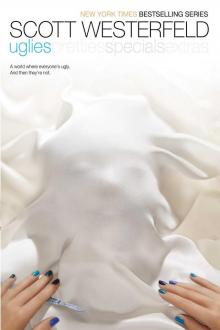 Uglies
Uglies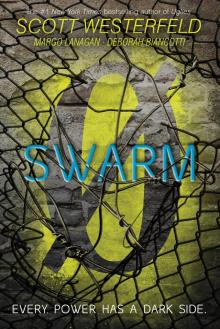 Swarm
Swarm Pretties
Pretties Zeroes
Zeroes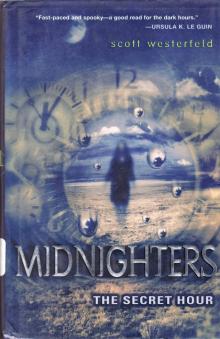 The Secret Hour
The Secret Hour Behemoth
Behemoth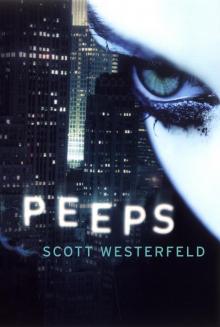 Peeps
Peeps Specials
Specials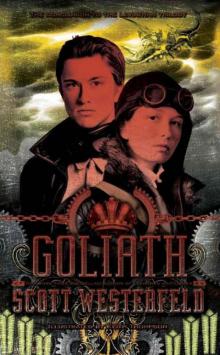 Goliath
Goliath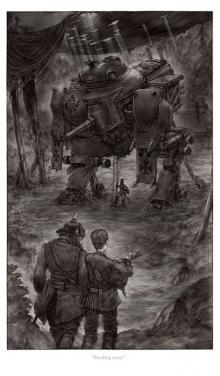 Leviathan
Leviathan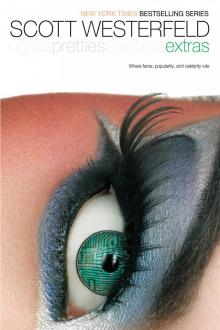 Extras
Extras Shatter City
Shatter City The Risen Empire
The Risen Empire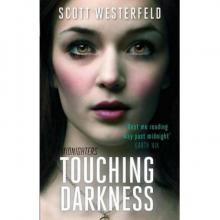 Touching Darkness
Touching Darkness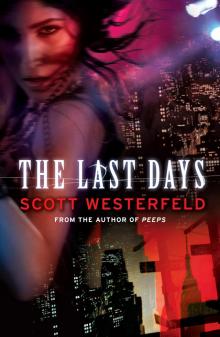 The Last Days
The Last Days So Yesterday
So Yesterday The Killing of Worlds
The Killing of Worlds Afterworlds
Afterworlds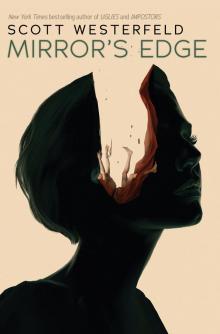 Mirror's Edge
Mirror's Edge Evolution's Darling
Evolution's Darling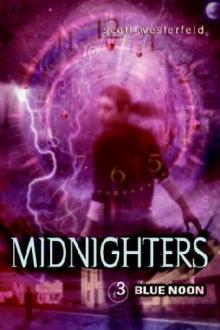 Blue Noon m-3
Blue Noon m-3 Touching Darkness m-2
Touching Darkness m-2 Impostors
Impostors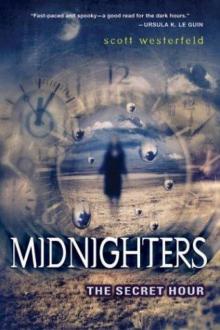 The Secret Hour m-1
The Secret Hour m-1 Leviathan 01 - Leviathan
Leviathan 01 - Leviathan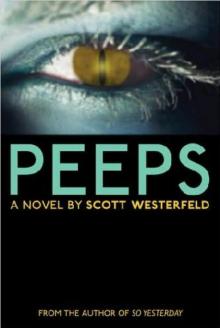 Peeps p-1
Peeps p-1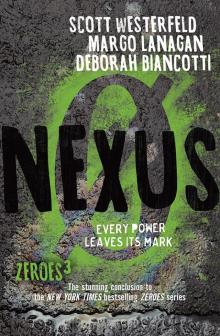 Nexus
Nexus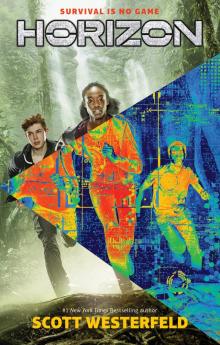 Horizon
Horizon Bogus to Bubbly
Bogus to Bubbly Goliath l-3
Goliath l-3 The Last Days p-2
The Last Days p-2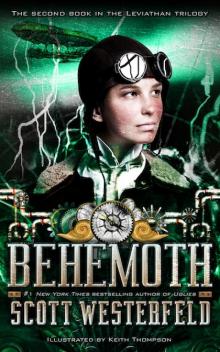 Behemoth l-2
Behemoth l-2 Stupid Perfect World
Stupid Perfect World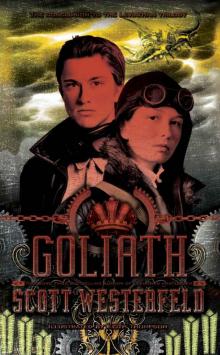 Goliath (Leviathan Trilogy)
Goliath (Leviathan Trilogy)